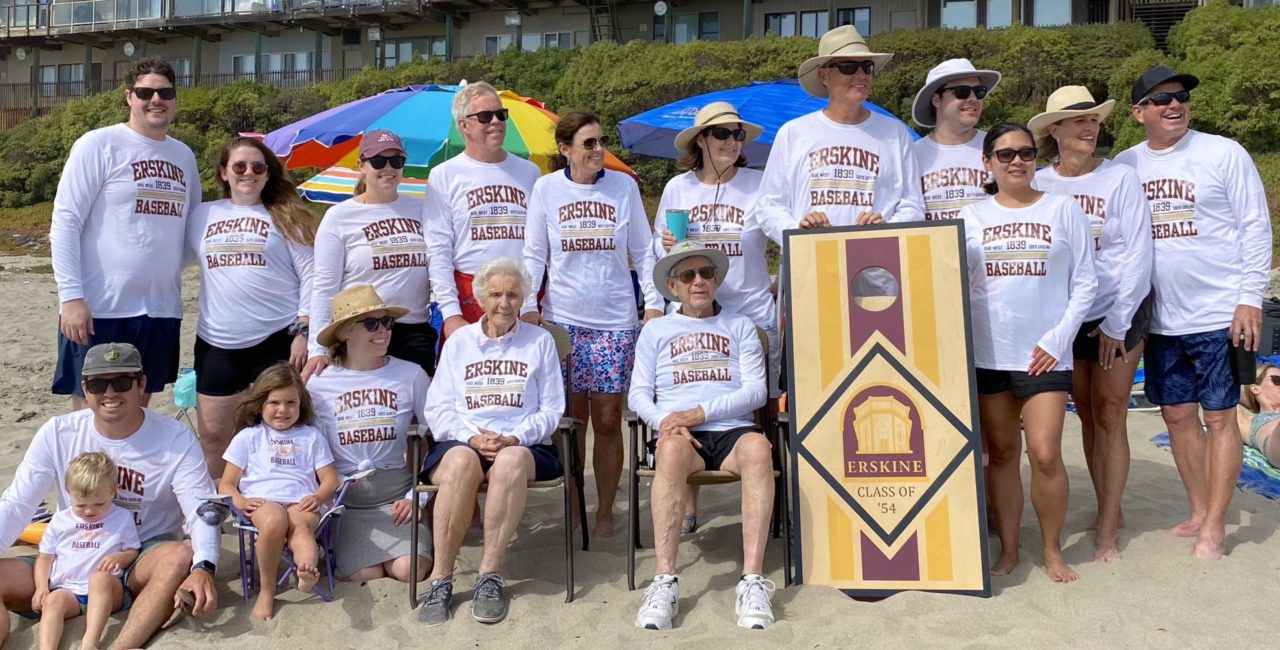
Alumnus marks 90th birthday with Erskine flair
Retired Maj. Gen. James Donald ‘Don’ Stroup of Roseville, California, a member of the Erskine College Class of 1954, celebrated his 90th birthday this year. His family chose to observe the occasion in a way that recalled his time at Erskine. Here he speaks about his military service, his student days, and more.
Clocking more than 9,000 flying hours in the EC-121 (originally designated RC-121)—a plane which “provided early warning by detecting and tracking enemy aircraft,” according to the National Museum of the United States Air Force—Don Stroup was stationed in Alaska, California, and North Dakota as well as in British Columbia and Germany during his 20 years in the United States Air Force Air Defense Command.
Temporary duty took Stroup, who served as a navigator and weapons controller, to Iceland, Japan, Korea, Thailand, and Vietnam—and to Florida during the Cuban Missile Crisis in 1962.
“We were based out of McCoy Air Force Base in Orlando and flew our missions south of Florida,” he says of his experience during that time of tension. “We were maintaining surveillance on our U-2 aircraft as they were flying over Cuba.”
Participation in military surveillance during the Cuban Missile Crisis might seem to be a dramatic activity, but this alumnus, who played baseball for the Fleet nearly seven decades ago, claims, “I really didn’t have a very exciting life,” adding, “I have been blessed with a great family.”
Stroup and his wife Janette had four children, and by the time his 90th birthday rolled around this year, the couple had been blessed with quite a few grandchildren and great-grandchildren. His family arranged a memorable birthday celebration for him, taking as their theme his years as an Erskine baseball player.
“My whole family was here, including my four great-grandchildren,” he recalls. “They had Erskine T-shirts for everyone, the decorations were in Erskine colors, and they gave me a cornhole game with an Erskine logo.”
Athletics played a significant role in Stroup’s college experience. “Sports was a big part of my time at Erskine. I was always involved with the intramural program and fortunately made the baseball team,” he says.
Following his military service, Stroup worked with the California Department of Transportation as an accounting supervisor.
Having lived in California for more than 60 years, he has not kept up with most of his classmates, though he stayed in touch with Josephine ‘Jo’ Packett Hanson ’54, who, he says, “met and married one of my cadet classmates in Florida.”
Thinking about college days, Stroup remembers his baseball coach, Gene Alexander, as a “great mentor,” and a professor, Dr. J.M. Lesesne—who became president of Erskine in 1954—as “an inspiration to me.”
He kept in touch with Lesesne’s son. “I was in school with his son Joe (Dr. J.M. Lesesne, Jr. ’59), who later became president of Wofford College. I kept in contact with Joe through my nephew who attended Wofford,” Stroup explains.
“A small college was perfect—I was not lost in the crowd and was able to keep God in my life,” Stroup says, noting that he and his wife have been members of Celtic Cross Presbyterian Church, where he has served as an elder and deacon, for some 50 years.
Looking back on his time at Erskine, he says, “The friendships and support I received from everyone were big factors in preparing me for the future.”
Pictured above at La Selva Beach in California are Don Stroup, seated in a chair next to the Erskine cornhole board, with his wife Janette, also in a chair, surrounded by several generations of family members.
